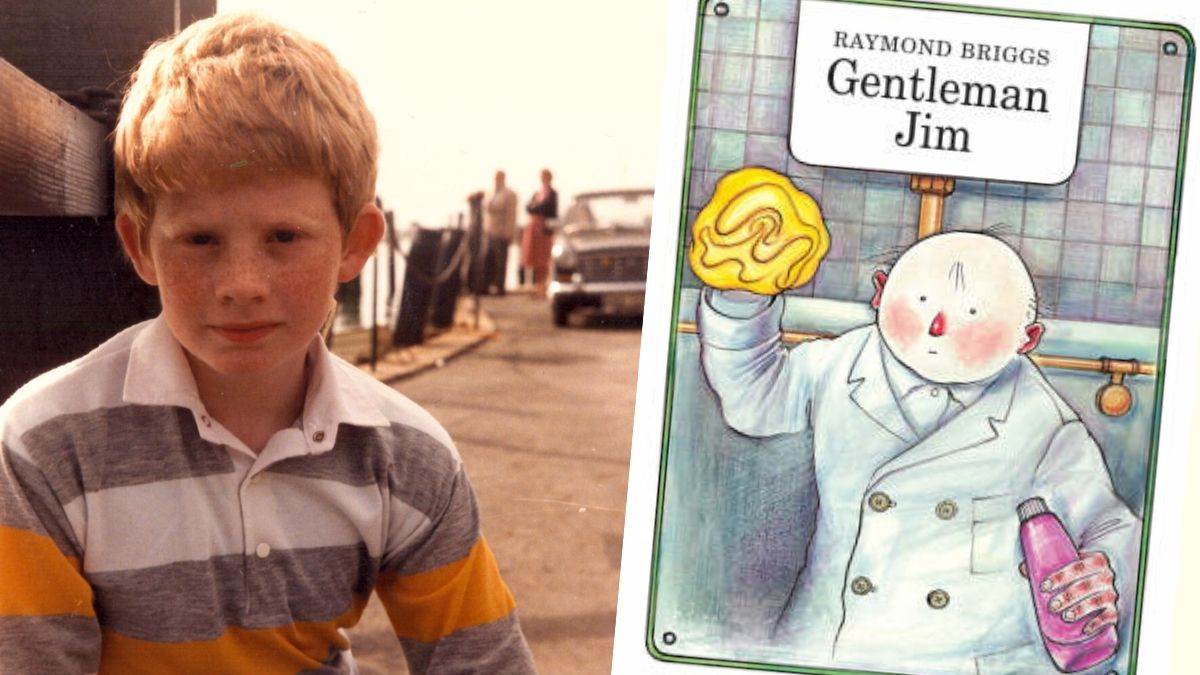The Book That Made Me: A F Harrold
Published on: 19 February 2020
A.F. Harrold is an English poet who writes and performs for adults and children. He tells us all about the books that inspired him as a child.

I have written and spoken about being left alone in Horsham library as a child in the ’80s, while my dad went to his evening job, cleaning offices and dentist’s surgeries, and in and from that library I read many, many books that are all lying deep in the mulch of my subconscious, mostly forgotten but invaluable.
It’s some of the books that lived at home I’d like to mention and give a call out to today. I’m going to have a look at the shelves, here in my office at the end of the garden, and see what has travelled forty years into the future with me, then we’ll pick one or two to focus on.
On the poetry shelf, just to my right, is Spike Milligan’s Silly Verse for Kids, a tatty second-hand copy from some jumble sale, almost-but-not-quite crumbled away to dust, and Stevie Smith’s Collected Poems… perhaps more a book of teenage years that one, but still, dipping delicately, there is so much strangeness in there a child found a bite or two.
Further along I find some picture books, Where The Wild Things Are, Haunted House, Dunmousie Monsters (by Robin and Jocelyn Wild – the story of a dinosaur and a mammoth who live in a Scottish castle, that I have a clear memory of reading to my primary school class in a show-and-tell type session).
Here is the Michael Hague illustrated edition of The Hobbit, and a book called Phenomena (subtitled A Book of Wonders, with 216 illustrations) by John Michell and Robert J.M. Rickard – one of a number of ‘Unexplained’ books I remember, like the recently reprinted Usborne guide. No wonder childhood seemed more haunted and numinous than adulthood, reading of timeslips and falls of fish and spontaneous human combustion at every turn.
Here is the Brimax Books (whatever happened to them?) edition of The World of Myth and Legend, by Brenda Ralph Lewis, illustrated by Rob McCaig. It was here I learnt my versions of the Theseus and Jason and Beowulf and Bellerophon and Siegfried and Sir Gawain stories… a legendarium that balanced exactly and with equal reality with George Lucas’s cinematic dream.
Two final books come to hand – one stands for a whole world, a very tatty copy of Hergé’s The Secret of the Unicorn, but it could be any of them. These were the comic strip adventures I most loved – from the moon, to the Andes, from Tibet to the bottom of the sea, from Marlinspike Hall to the Middle-European intrigues of King Ottakar’s Sceptre and The Calculus Affair… it was all just plain brilliant.
And the final book, another that I have often talked about and for me an essential corner-stone of my being, Raymond Briggs’ Gentleman Jim. Other books by Briggs are more famous and more exciting and more sharp-elbowed, but none are this one.

Jim Bloggs is a public lavatory attendant in Birmingham who reads the job advertisements in the paper. He sounds out the long words, syllable by syllable, and wonders to his wife Hilda what all these ‘levels’ are that are required. "I bet it’s all to do with Education – that’s what it is…" he thinks. "They give them these things at school nowadays. All we got was a Bible and a thick ear."
There is little malice in Jim as he thinks these things, or as he daydreams about being a tail-gunner or an artist in a Parisian loft or an executive ("Oh yes dear? What are they?" asks his wife Hilda, innocently enough) with a briefcase and pocket calculators. Eventually (without giving too much away) Jim becomes a highwayman and ends up before a judge and banged up in prison… where he finds out he can study for The Levels while he’s in, and not only that, but where they’ve put him on the toilets, because he’s an expert.
Briggs is writing about his dad and my dad here (both milkmen)… about the Ronnie Corbett in the "I know my place" sketch from The Frost Report. It is the unfathomable machinations of bureaucracy and minor officials (Jim faces the council planner, the jolly huntsman from the RSPCA, the shopkeeper, the police, the judge – in fact the only one who looks on him with any kindness is Miss Camilla in the bookshop (who I only now see looks like Briggs’ late wife, Jean)), the maze of the unknown interactions of people who’ve been given a glimpse of the rulebook that rest of us are denied.
This was every day of school, of sports, of trying to fit in… it was awful.
My mother would be forever sending me to the counter to return things or to pick up the prescription or to order the drinks, and I would quake… faced with even minor authority figures, faced with the uncertain footing of the naïf thrust headlong into the wide world, I would weep with fretfulness and shame.
These feelings haven’t entirely vanished with adulthood, and I still recognise the Gentleman Jimness of it in myself, a small man who really just wants to hide.
I was in tears reading it as a kid, and I’m in tears looking at it now.
(I wrote to Briggs’ years later, a thank you letter for Gentleman Jim, and he was kind enough to write back, and send me a signed copy when the Canadian press Drawn and Quartered published it as an exemplar and forerunner of the graphic novel. His letter sounded slighted bemused by this happening.)
Topics: Classics, Features, The Book That Made Me
Greta Zargo and the Death Robots from Outer Space
Author: A.F. Harrold Illustrator: Joe Todd Stanton
Greta Zargo is the key to protecting planet Earth from space robots - but is she too busy tracking down a cake thief to notice? A silly joy of a book that mashes up The Hitchhiker's Guide to the Galaxy with The Great British Bake Off.
Read more about Greta Zargo and the Death Robots from Outer Space






